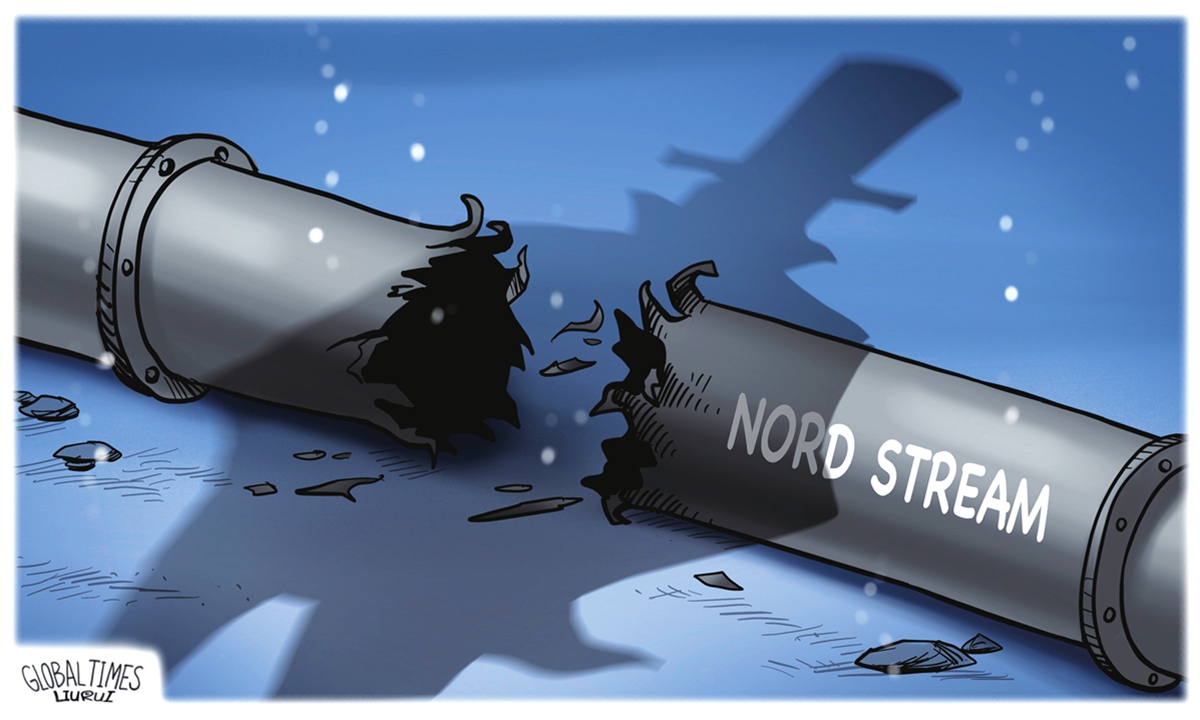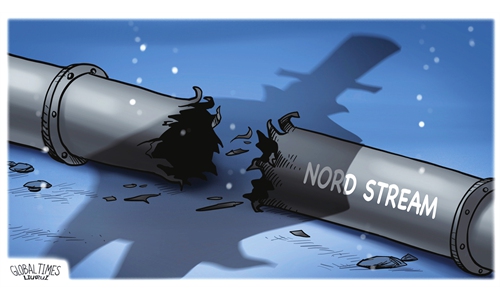Physically impossible for Nord Stream sabotage to have occurred the way intelligence told the NYT: former CIA analyst

Illustraion: Liu Rui/GT
Editor's Note:After US investigative journalist Seymour Hersh revealed that the US is the mastermind behind the Nord Stream pipeline explosion, the New York Times (NYT) published an article that pushing a different narrative, which claimed that a pro-Ukrainian group carried out the attack. Is the NYT revelation credible? Who is the culprit for the Nord Stream pipeline attack? Former CIA analyst Raymond McGovern (McGovern) told Global Times (GT) reporter Xia Wenxin that it's "physically impossible for the incident to have occurred the way CIA and other intelligence officials are telling the New York Times." He believes this is an attempt to "deflect attention from what every sensible human being that concludes it was a US authorship of this sabotage."
GT: The NYT on March 7 reported that according to new intelligence reviewed by the US, "a pro-Ukrainian group" carried out the attack on the Nord Stream pipelines last year. Kiev has already denied this. Why do you think the US intelligence suddenly blamed a "pro-Ukrainian group" for the incident? Is there enough credibility in the NYT article?
McGovern: It's an attempt to deflect attention from what every sensible human being that concludes it was a US authorship of this sabotage. It makes no sense. It took the intelligence community whispering into the New York Times' ear a whole month to come up with what is a comical effort to blame someone else.
Now, I won't go into the details, but it's physically impossible for the incident to have occurred the way CIA and other intelligence officials are telling the New York Times. It is what the British call - rubbish. It doesn't stand close scrutiny.
On the other side of things, you have not only the most authoritative, the most trusted, the most respected journalist in America, Seymour Hersh, who has been very good at telling true stories, however, embarrassing as it may be to our government, and who protects his sources quite well. He says, in a very detailed rendition of what happened, that the US was behind the attack and was helped by Norway.
Besides that, we have the typical indexes that you look for. You're researching a crime and trying to find out who did it, who had the motive. The motive was clear: The US has been expressing astonishment that the Germans and the Russians would get this close together, and that had to be stopped. US officials said it had to be stopped, and guess what? President Biden, according to Seymour Hersh, approved the stopping of it.
Not only President Biden, but after the pipelines were blown up, all kinds of people couldn't hold it in, and they were so proud of being able to put an end to the pipelines. Undersecretary of State Victoria Nuland bragged: "I am, and I think the administration is, very gratified to know that Nord Stream 2 is now, as you like to say, a hunk of metal at the bottom of the sea." Secretary of State Antony Blinken called it a "tremendous opportunity to once and for all remove the dependence on Russian energy."
So you have ability, you have incentive, you have people pretty [much] admitting what they did, then people rejoicing over it. That's enough for me. All the rest of the stuff is, again, what the British call "rubbish."
GT: The US, which initially had vehemently called for an investigation into the sabotage, became silent since Hersh released his investigative report. Why did this happen?
McGovern: The Hersh article was too embarrassing [for the US]. It took the New York Times one month to figure out how to react. They didn't mention Hersh's article till way down the 26th paragraph, if I recall correctly.
What happened was this. Hersh used to publish articles in the New York Times. He was their star investigative reporter back in the 1960s and the 1970s, front page all the time on Vietnam and everything else.
Then he fell out of favor because he kept telling the truth and the government has more influence in the New York Times as each decade goes by. He started publishing in the New Yorker magazine, and then in the New York Review Books, and then in the London Review of Books, and then nobody would take his articles. So he had to go to the German newspaper Die Welt because he had a friend there. That was a couple of years ago. Now someone told them, "Look, you don't have to go through all this stuff, just self-publish." So he published on Substack.
So why did everyone keep silent? Well, No.1, because it was a Substack thing, and they could just kind of suppress it. And No.2, it's too hot to handle. No.3, Hersh has an incredible reputation. They just didn't know what to do, and so their default reaction is to see no evil, hear no evil, speak no evil.
Now it still took the officials who whisper in the New York Times four weeks to figure out how to handle it. We will deflect attention by claiming, again, in a very absurd way that a yacht and a couple of divers did this job. And maybe they were pro-Ukrainian. We're not accusing Zelensky, but it was Ukrainian, though.
Aside from its stupidity and absurdity, it [the NYT article] names the Ukrainian - unofficial Ukrainians. But if this turns out to be official Ukrainians, support for Ukraine is gonna dissipate in Europe and elsewhere.
So that's sort of a thing we pay attention to. It's very unusual that the New York Times propounds this kind of thing and blames Ukraine. We'll see what happens in the coming weeks.
GT: On February 21, you attended a UN Security Council meeting on the Nord Stream pipeline attack and delivered a speech. Can you elaborate on this event?
McGovern: The session of the UN Security Council at which I spoke was called to discuss the pipeline sabotage and specifically Hersh's article on it. Now, what the Russian delegation had proposed was a UN Security Council investigation. What could be more sensible? Had there been investigations before? Well, sort of.
There has been an investigation, but the results are - What a reason! - secret.
So that was the background for this UN Security Council meeting. And the Russians made the case that if the Security Council is worth anything - it was created to look into acts of war and this kind of international sabotage, so let's get on with it, let's have an investigation by an independent body, namely the UN Security Council.
Now they went around, and various members spoke, but only the representatives of China spoke out in favor of what the Russians had proposed. They, too, said that it just makes very good sense to have an independent investigation, and why don't we do that?
And, of course, the question was left hanging. They will have to be a vote on that resolution. But if the US, Britain, and France veto it, as they surely will, there'll be no investigation by the Security Council of the UN, which would be a scandal. If the UN Security Council can't do this with all the obvious reasons to do it and all the evidence that's now available, what can the UN Security Council actually do?
GT: In your opinion, will the US be the biggest obstacle to investigating the Nord Stream incident?
McGovern: The US already has been. Of course, it will. If you're the perpetrator of a crime - which I think it's very clear in this case, the US is - you do your best to deflect attention from it, and you do your best to make sure that it is not investigated properly. That's just common sense; it's common usage among criminals.

